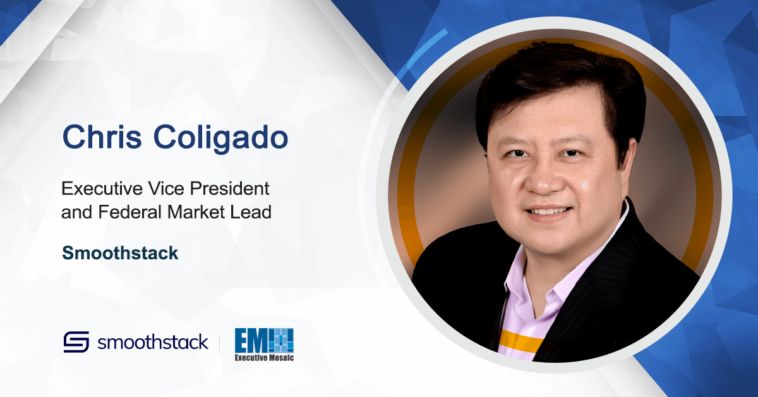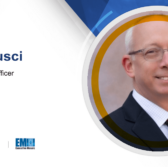Chris Coligado made a bold decision this year and it’s paying off swimmingly. After spending the vast majority of his career — almost a quarter century — with Booz Allen Hamilton, he made the jump to a small business. Coligado began at information technology company Smoothstack in June. The organization specializes in app development, cloud, data engineering and artificial intelligence and cybersecurity, among others. Coligado is fearlessly leading its federal business; they needed someone who knew their way around the intersection between government and technology and gave Coligado a call.
The executive was part of the team that evolved Booz from a mid-tier to one of the inarguable power players in government contracting, so he was a natural choice. He eventually became head of digital for Booz Allen’s finance services and regulatory division, and worked in other sectors like homeland security, transportation and justice.
Coligado sat down with ExecutiveBiz to talk about his love of the blend of technology and mission-focused work that’s inherent to GovCon, to shed light on his contract pursuit strategy and give us a window into life at a small business with big values and ambitions.
One of the most anticipated GovCon networking events of the year is fast-approaching: the Potomac Officers Club’s 2024 Homeland Security Summit. On Nov. 13, join us as we bring together executives from Customs and Border Protection, CISA, the Transportation Security Administration and more! If you’re in the industrial base and want to know how you can best partner with DHS, this event is essential. Register here.
ExecutiveBiz: How do you set your priorities around limited capture dollars? What goes into the decision-making process of what contracts you want to go after?
Chris Coligado: We’re very disciplined, especially as a small business. We can’t pursue everything. My first focus when I joined Smoothstack was to assess where our capabilities lie—what our bread and butter is in terms of revenue generation—and then define our service lines. We ultimately established three: consulting solutions, talent scaling and partner training. When we look at any pipeline or forecast from various parts of the government, we ensure it’s aligned with these three service lines.
Specifically in the consulting arena, we’re not trying to cover every area. We identified five technology capability offerings and their application within sectors, such as case management modernization, data and AI, application development, digital platforms, infrastructure solutions and cybersecurity. So, when we review forecasts, if something doesn’t align with these capabilities, we pass. We also consider agency focus, leveraging the team’s experience and past performance with specific agencies to filter opportunities. If it doesn’t fit within those agencies or our five capabilities, we take a pass.
This disciplined approach helps us focus on opportunities where we have a good probability of winning. As a small company looking to expand our footprint, we’re also seeking strategic partnerships with large and mid-tier systems integrators within the government. We cultivate these relationships to stay aware of their pipeline and identify areas where we can collaborate, especially where we’ve had successful partnerships in the past. We’re also broadening our partnerships to increase the chances of winning by aligning with high-potential partners and getting on as many winning teams as possible.
EBiz: How are you seeing GovCon companies respond to increased consolidation and competition? What are your thoughts on the upsides and downsides of this trend?
Coligado: This has been going on for a long time. Many of the names you’d recognize from 10 years ago are no longer around. There’s been a lot of consolidation, which has both upsides and downsides. The upside, at least for the government, is the convenience of working with fewer organizations that can deliver a broader range of services—a kind of one-stop shop. But with consolidation comes less competition, which means pricing may not remain as competitive when only a few players dominate the market.
This also squeezes out small businesses including those with new and innovative ideas. The environment is already tough for small businesses, and when larger companies continue to consolidate, it becomes even harder for smaller players to survive. I think acquisition shops and agencies, including the Small Business Administration, need to pay close attention to this. One solution could be enforcing small business set-asides or ensuring that large companies adhere to their small business plans, giving smaller businesses a fair share of opportunities. Without these measures, it becomes very difficult for new entrants to break in and could stifle innovation and new investments.
EBiz: Are there just some contracts you don’t go after, being a small business? Because you feel like competing against these big dogs is kind of futile?
Coligado: Fortunately, we’re still considered a small business, so we focus on opportunities where the vehicle is small business-friendly. Sometimes there are specific tracks for small businesses, and that’s where we target our priming efforts. However, we also recognize that large businesses, especially the top five revenue earners, have strong brand recognition and a proven track record with these agencies, whether the contracts are new or recompete.
We do not look at the large businesses as our competitors but rather our partners. We do our research on their positioning and aim to join their teams as a tier-one subcontractor with a very differentiated offering. While we may not be going in as the prime, we aggressively position ourselves as a valuable sub especially with our unique offerings for talent scaling solutions where we help our partners to develop net new talent that are not available in the open market.
Through our proven apprenticeship programs, we build cohorts of new technologists trained to the specific combination of technology disciplines and platforms through customized curriculums for their client’s needs within a short 10–12 weeks time. During this training timeframe our cohorts go through security clearance processing and are ready and productive on day one after completing the program. Our new consultants are then deployed anywhere around the country for their assigned projects and we cover relocation costs. It is easy to see how our model helps our partners alleviate risks while awaiting clearances, reduce overall price points for their clients with high quality trained junior resources and rapidly scale custom trained staff to any geography where needed.
That said, things get more challenging when a small business graduates into mid-tier status. At that point, you have to compete openly with larger organizations. This plays a big role in our strategy; you really need to plan for when you’re about to graduate. Winning business is great, but if you graduate too early without being prepared to compete with the larger companies, you could be in for a rude awakening.
EBiz: In addition to talent shortages, many contractors are also now having to consider in-person work requirements for federal agencies. How are you adapting to a post-pandemic work environment?
Coligado: It’s an interesting story. Smoothstack started in 2018, and just a couple of years after launching, the pandemic hit. Initially, we operated under a “hire-train-deploy” model, where we brought new entrants into the technology business and aimed to launch their careers after 10 to 12 weeks of training. This training was customized based on the needs of our partners or agencies across multiple technology stacks. We developed tailored curriculums to ensure that, from day one, the trainees knew exactly what to do. They were trained in various technologies, working in agile environments, using agile project management, DevSecOps and continuous delivery.
In the beginning, all training was conducted in person. We flew participants from all over the country and housed them at our training center in Tysons for the 10 to 12 weeks. But when the pandemic hit, we had to quickly pivot to virtual training, which was a big adjustment. Now, there’s a shift back, with people missing the in-person collaboration. So, we’re looking for a hybrid solution that offers flexibility—allowing people to work remotely for routine tasks—but still enabling collaboration when necessary. When people work together in an office, they can speed up decision-making and problem-solving.
For example, on my team, we offer a hybrid model with three in-office days per week. Fridays are designated work-from-home days, and team members can choose another day to work remotely. However, the commitment to three in-office days is important because my team, specifically in growth, needs to collaborate quickly to respond to new demands and procurements. It’s a balancing act, but collaboration is key when needed, and flexibility for remote work is important too.
One thing I want to emphasize is the importance of setting clear guidelines. In other places, without good structure, people may not be as productive. Some even take advantage of remote work, and I’ve heard cases of people moonlighting with second jobs. So, it’s really about finding the right people, fostering the right culture and establishing clear guidelines for a successful hybrid model. With that, I believe people will thrive.
EBiz: Is it harder to secure a meeting with someone from the government than it used to be, when you’re trying to partner and collaborate?
Coligado: It was definitely challenging during the pandemic because everything was shut down. People had to get creative. For instance, we’d sometimes ask, “Can we meet at Starbucks?” It probably led to more coffee or lunch meetings for those who were willing to meet in person. But for the most part, we had to adjust to virtual meetings.
Now, with the federal government pushing for more time in the office or hybrid arrangements, especially in the DC area, it’s becoming easier. I think about 60% of the workforce now has either a hybrid or in-office schedule.
When I visit government buildings for client meetings, it’s a stark contrast to how it used to be. I remember bustling hallways, but now when I visit, the buildings are often empty. I meet with someone in their office, and they’re often the only one there, saying, “I came in just to meet with you.” So, it’s important to be mindful about in-person meetings—making sure they’re truly necessary and productive—because people often go out of their way to make them happen.
EBiz: What advice would you give to those who are pursuing executive-level positions in GovCon and looking to accelerate their professional growth?
Coligado: It really depends on where you start. If you’re still relatively junior, it’s mostly about building competency and skills early in your career. But it’s also crucial to find a good mentor and sponsor. There’s a difference between the two—mentorship is valuable early on, and it’s good to have multiple mentors to guide you. As you progress and figure out what you really want to do, it’s helpful to find role models who exhibit the style and skills you admire. Eventually, having a sponsor or advocate is essential for growth because it’s not just about showcasing your skills but also about how you grow within the business.
In the GovCon space, moving into executive roles often requires more than just technical skills. Unless you’re in a highly specialized functional area, you’ll need to demonstrate your ability to build business. This can be a tough transition, especially for those who have focused on technology throughout their careers. Many struggle with shifting from a technical focus to a growth mindset and business development.
The skills that made you successful early on may not be enough for the next stage. Recognizing that you need to acquire new skills—especially people skills, networking and business acumen—is key. It’s not about making a full pivot but about broadening your skill set to become more valuable to the company.






